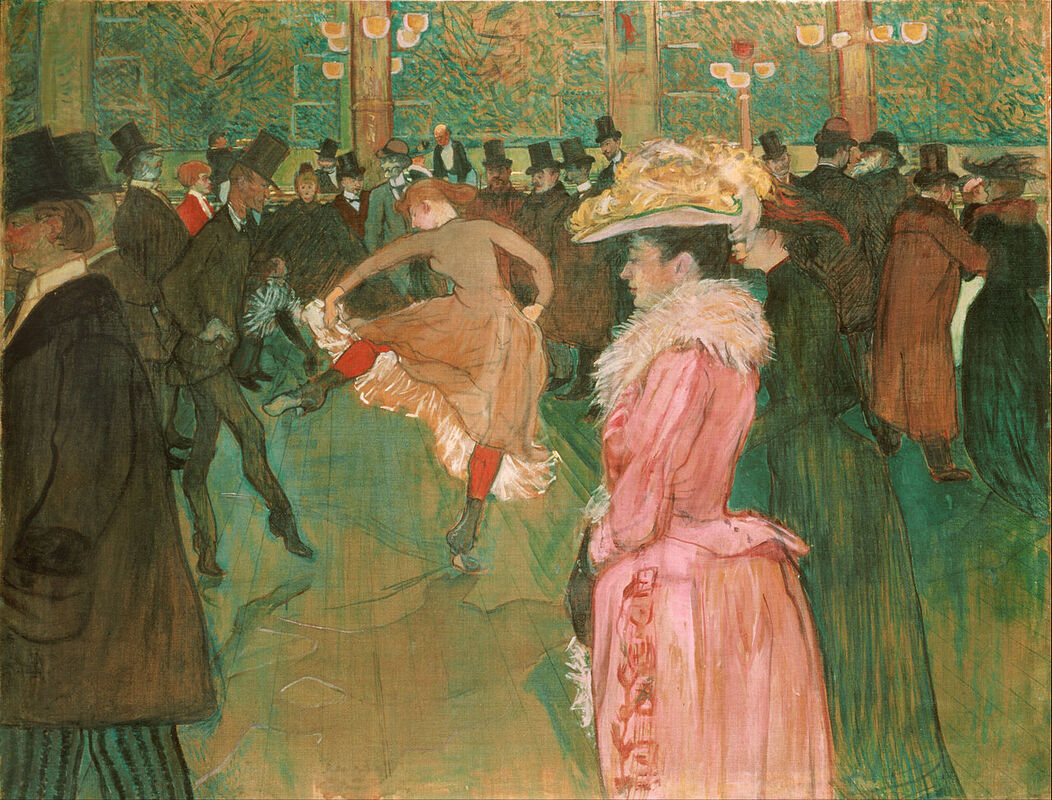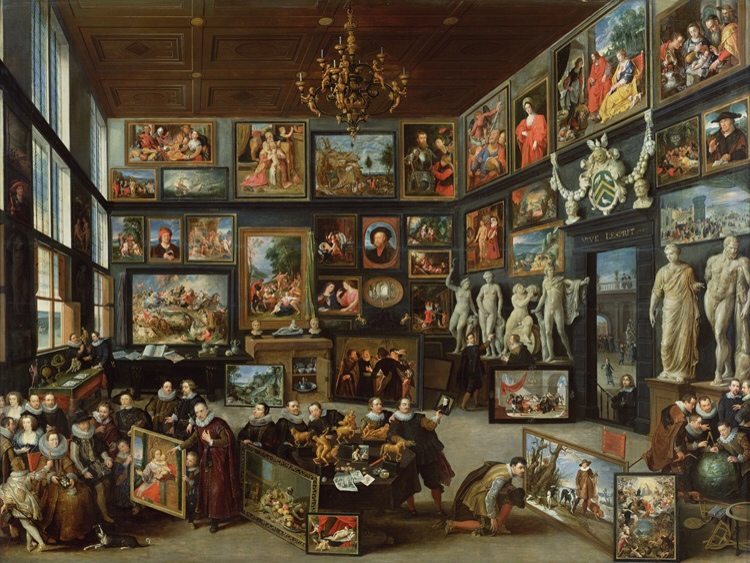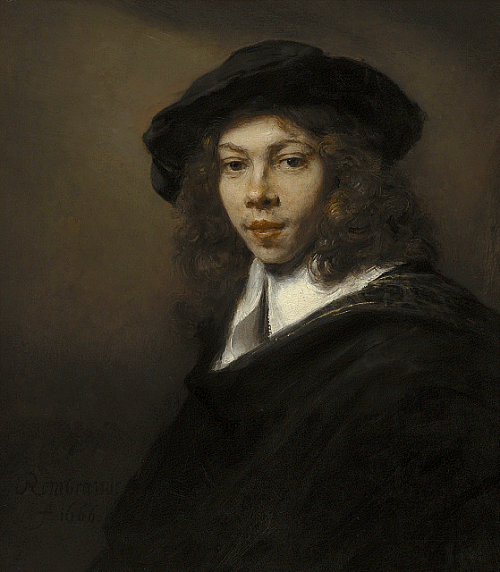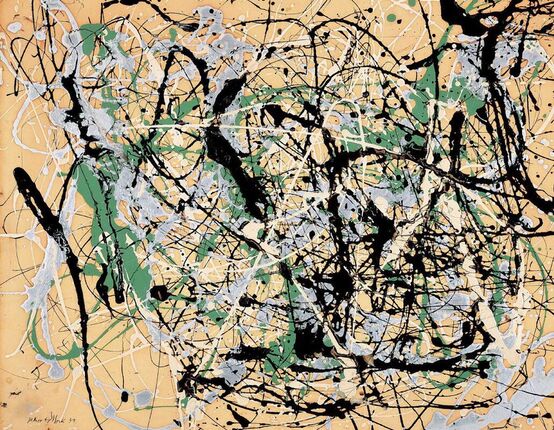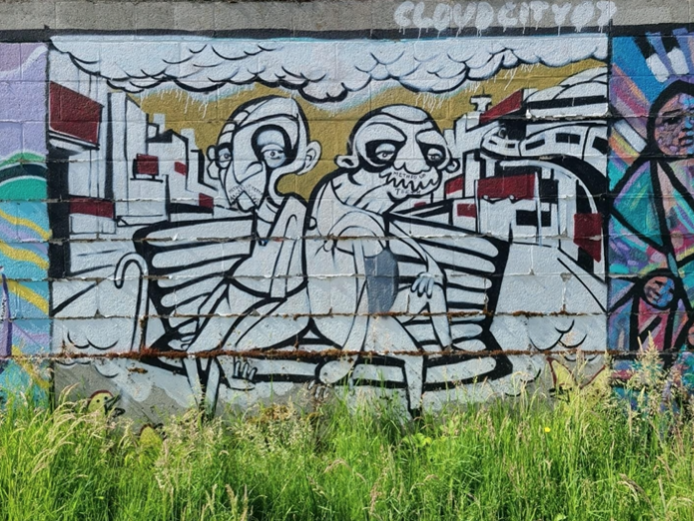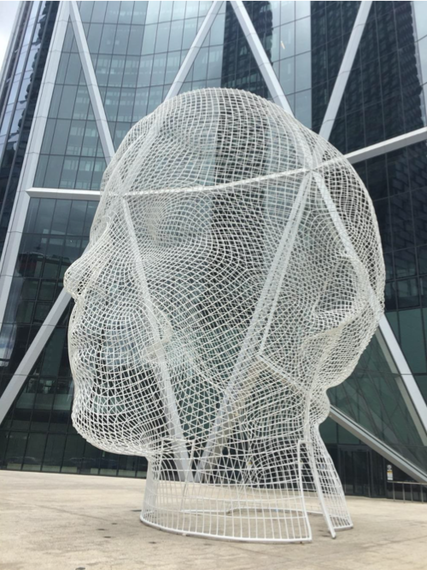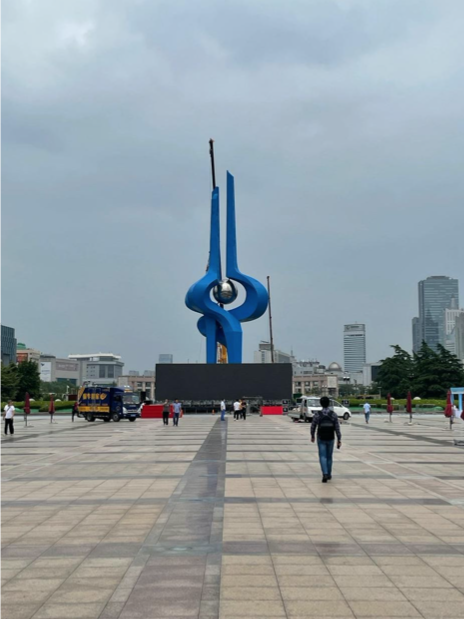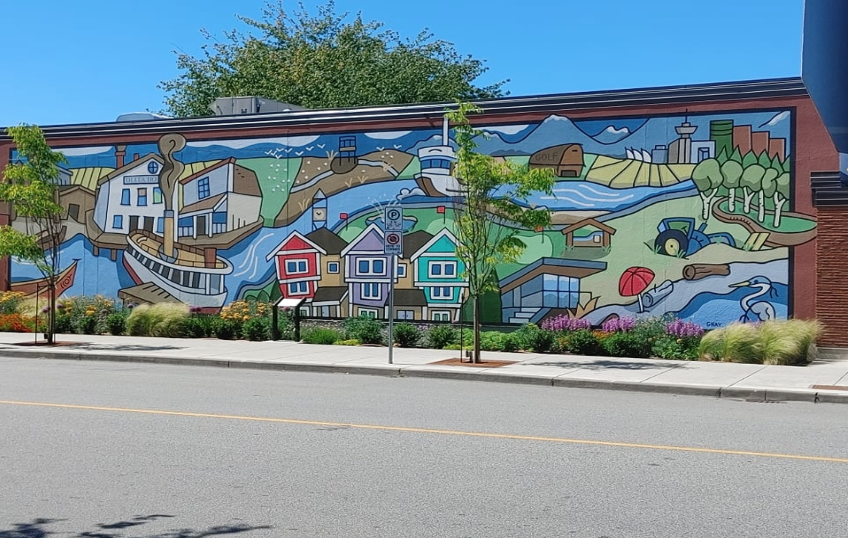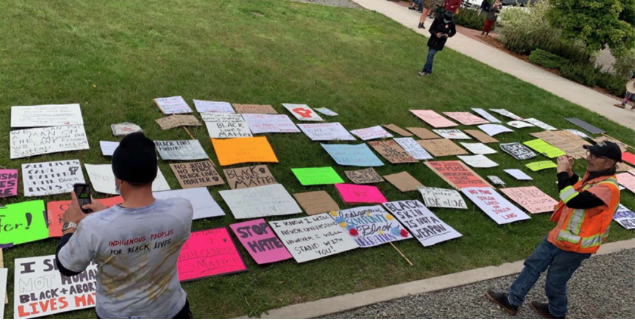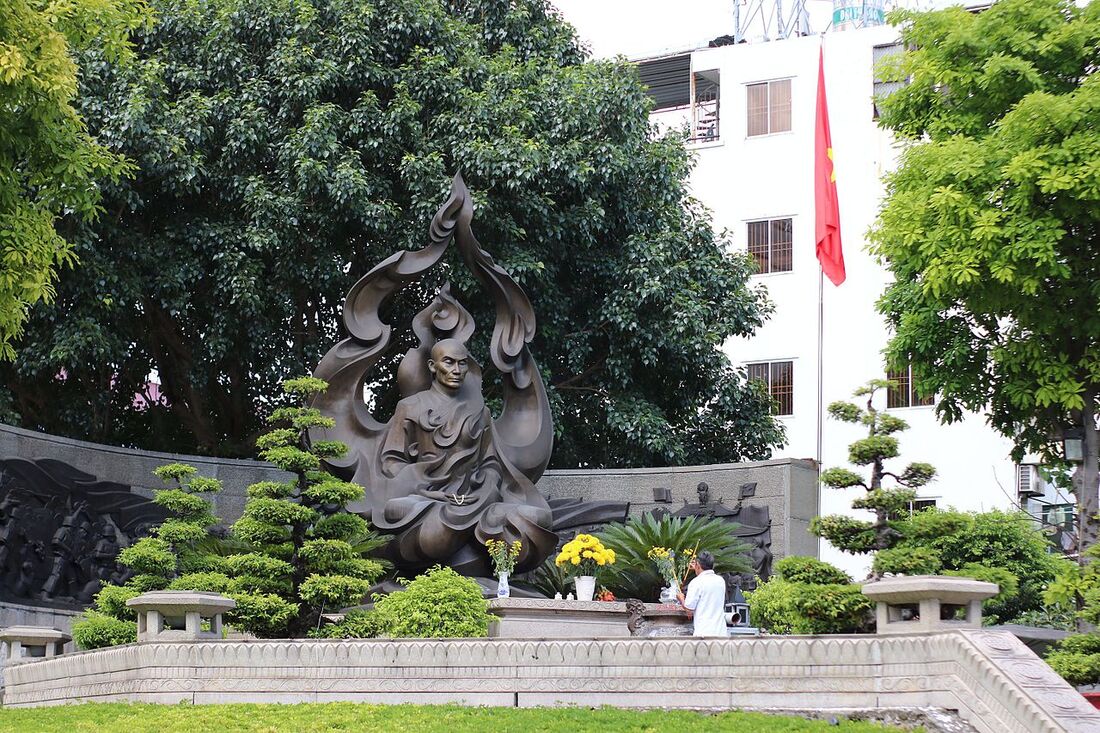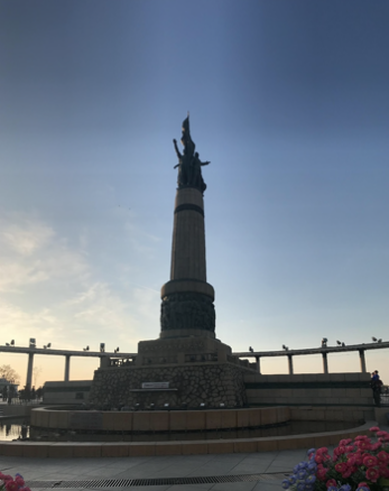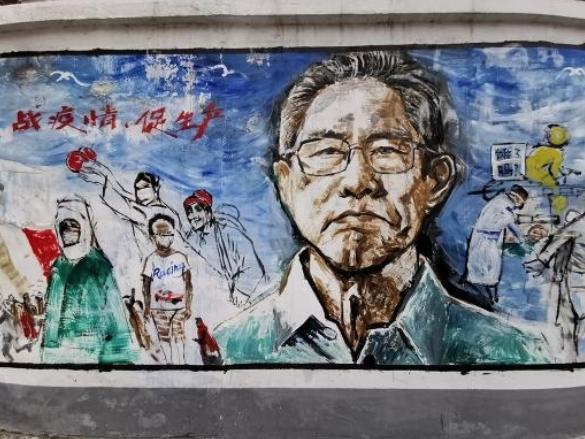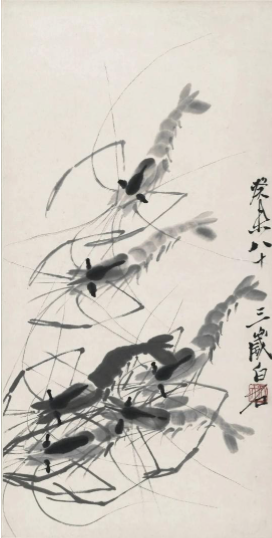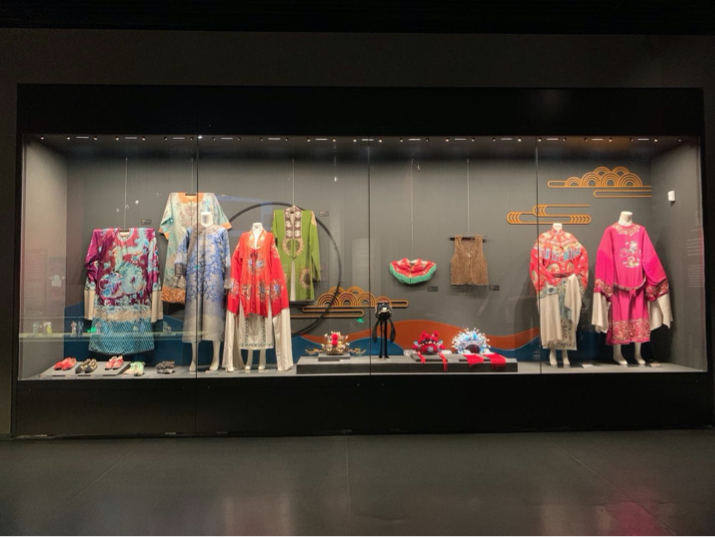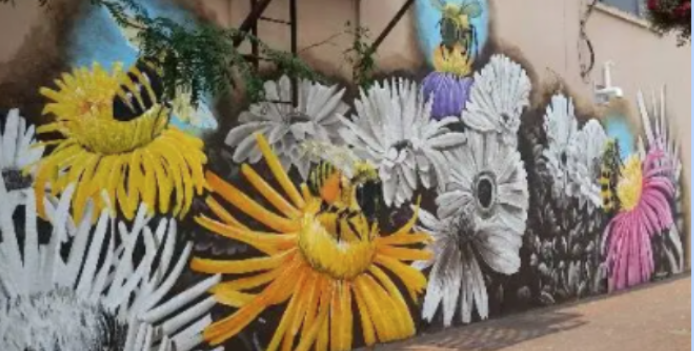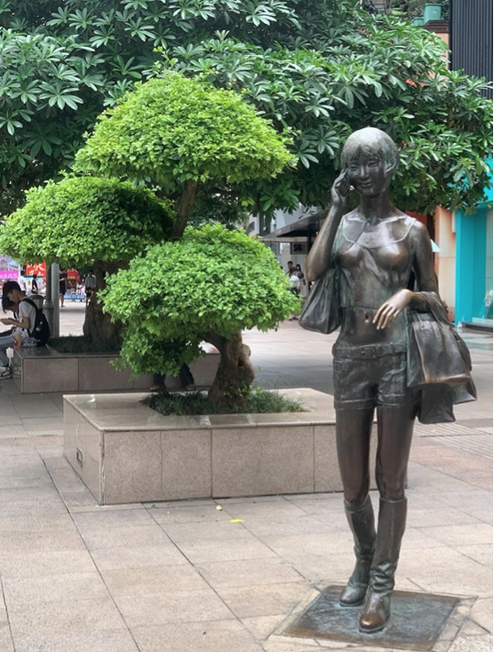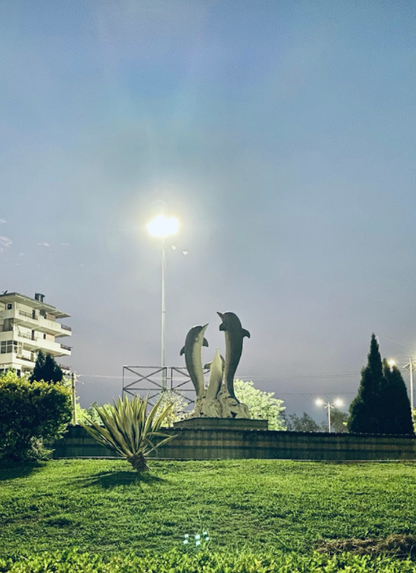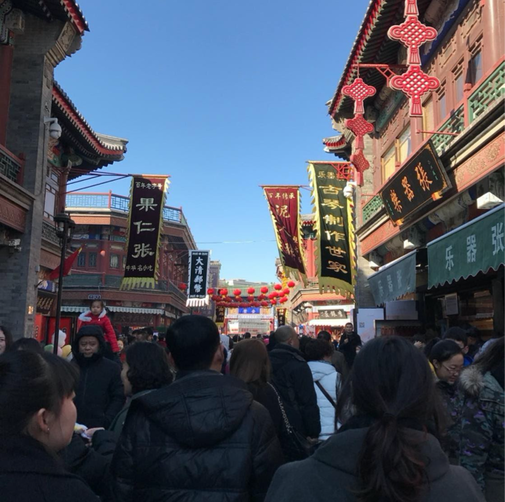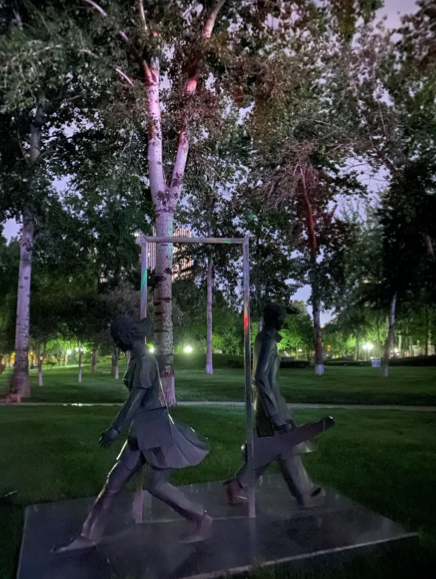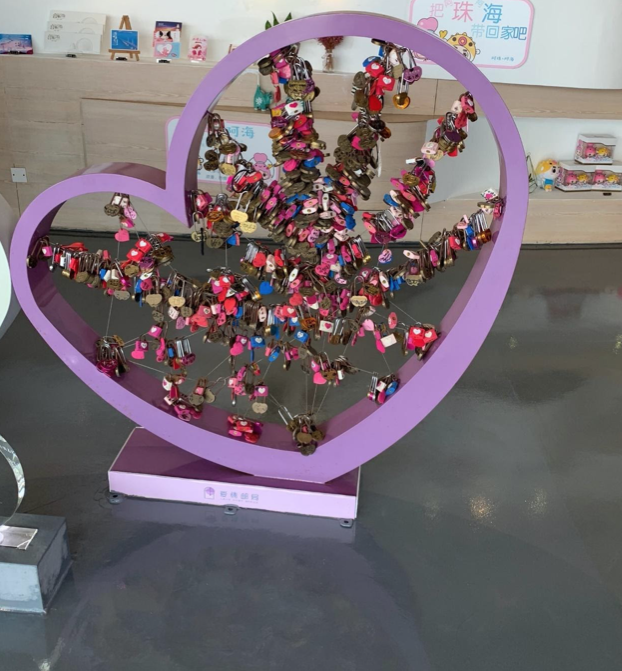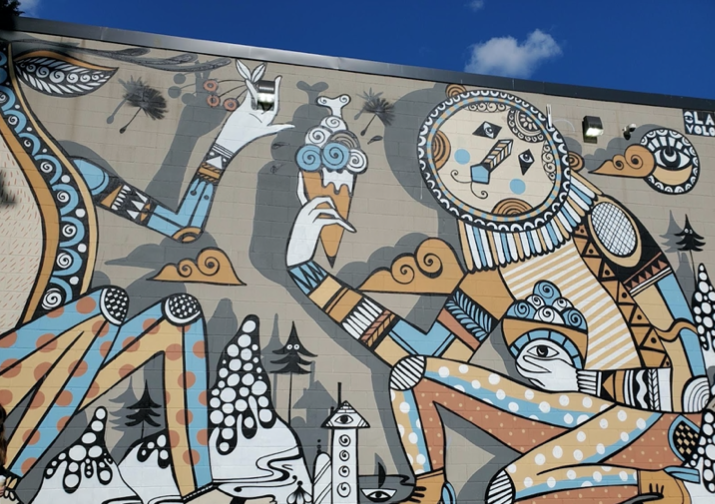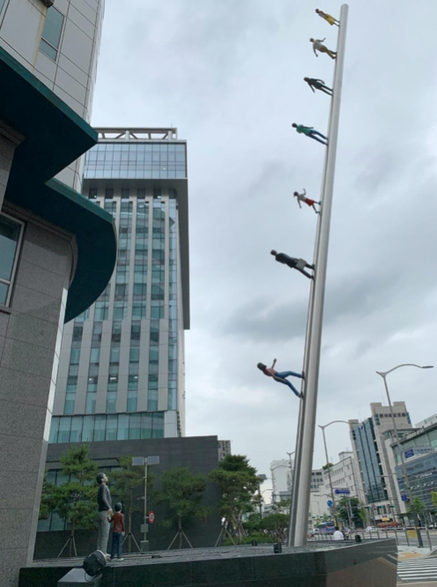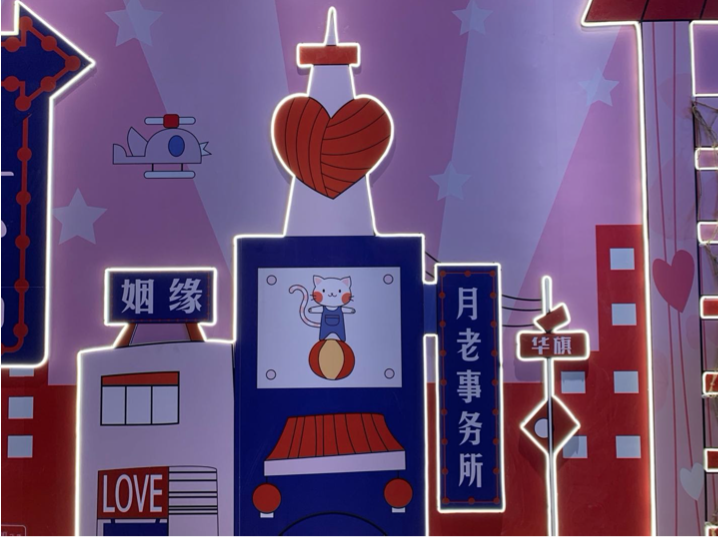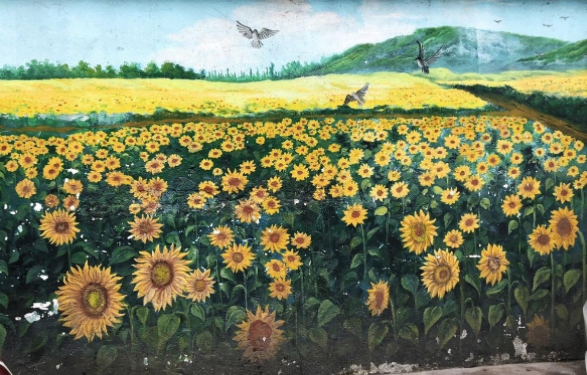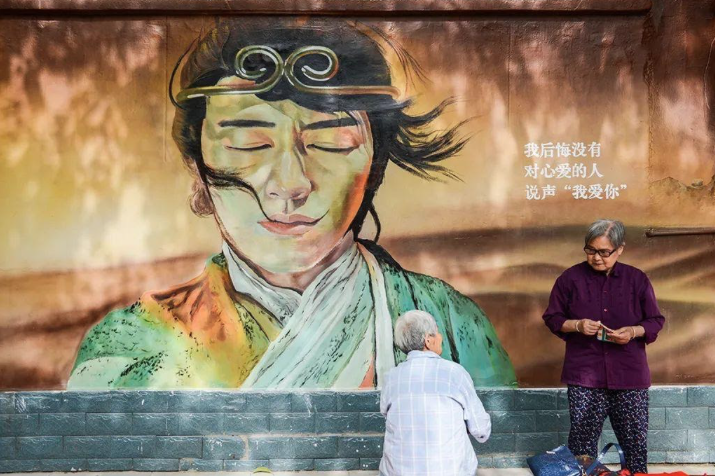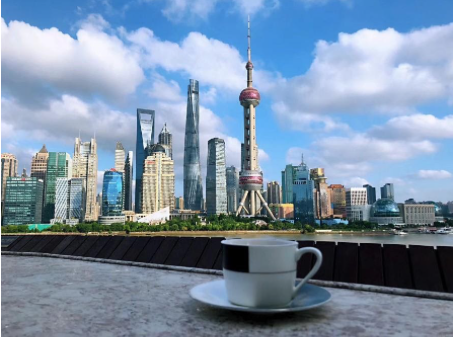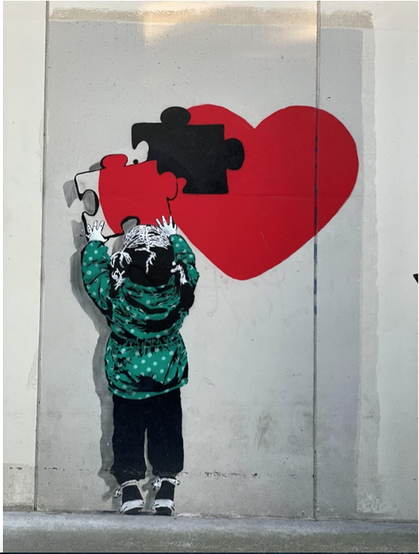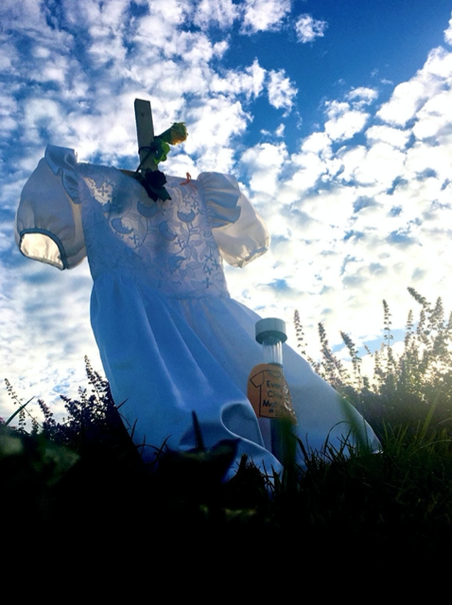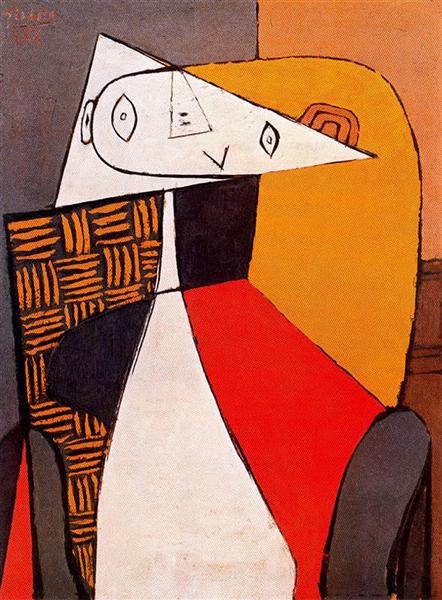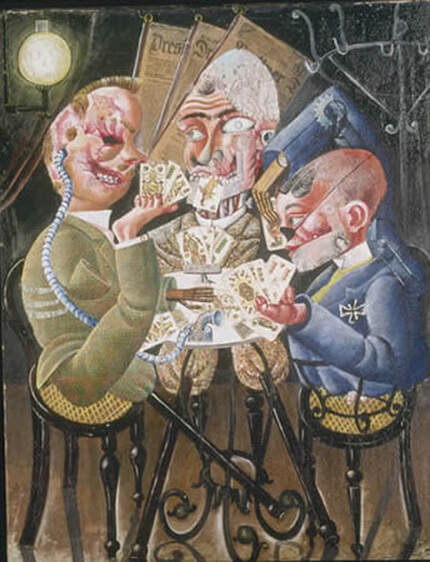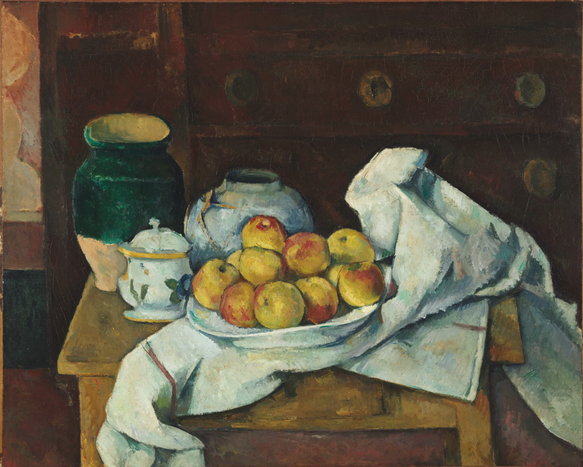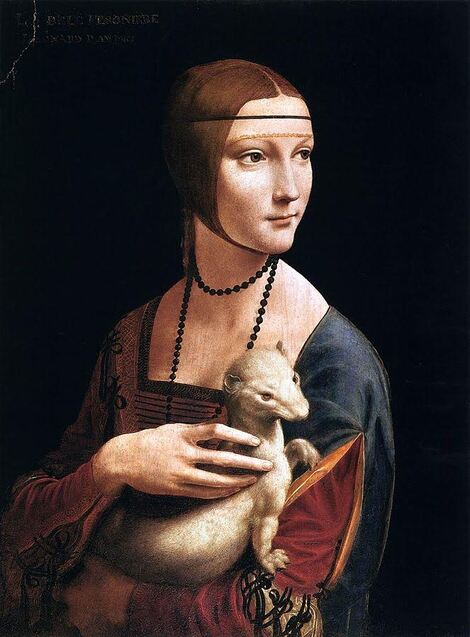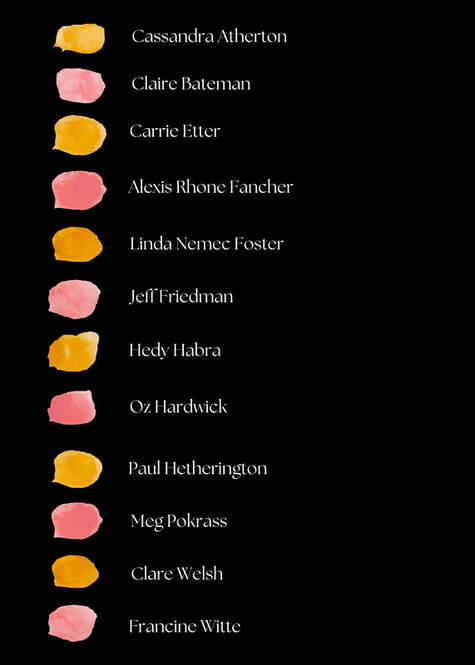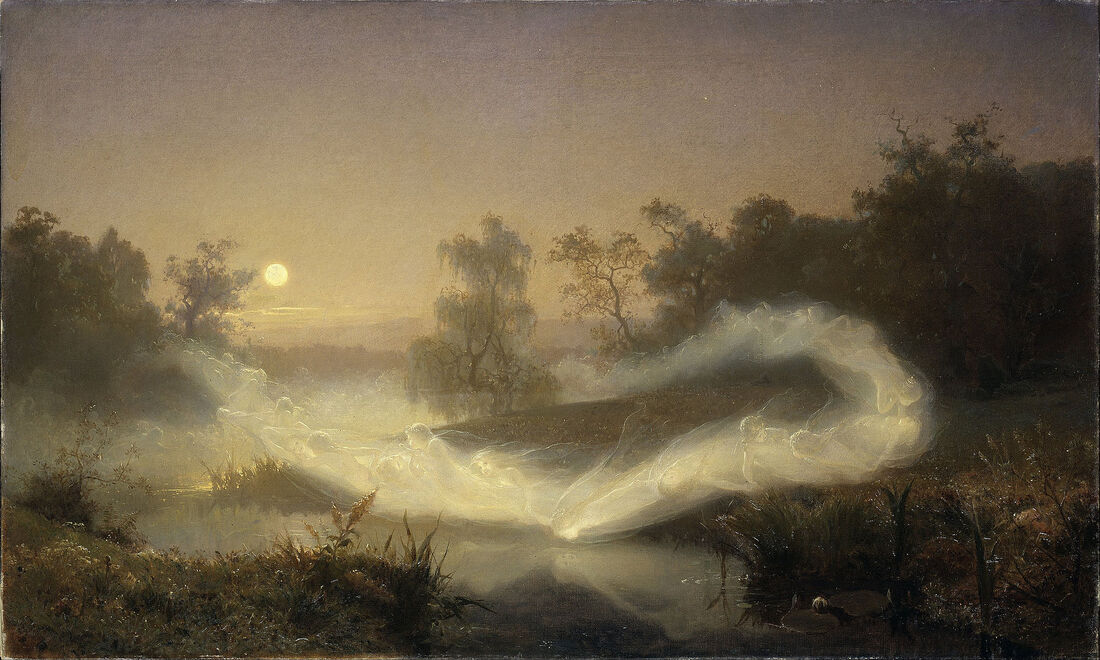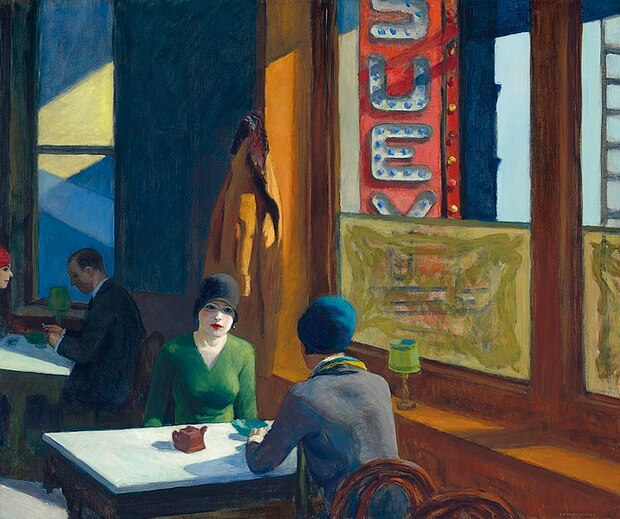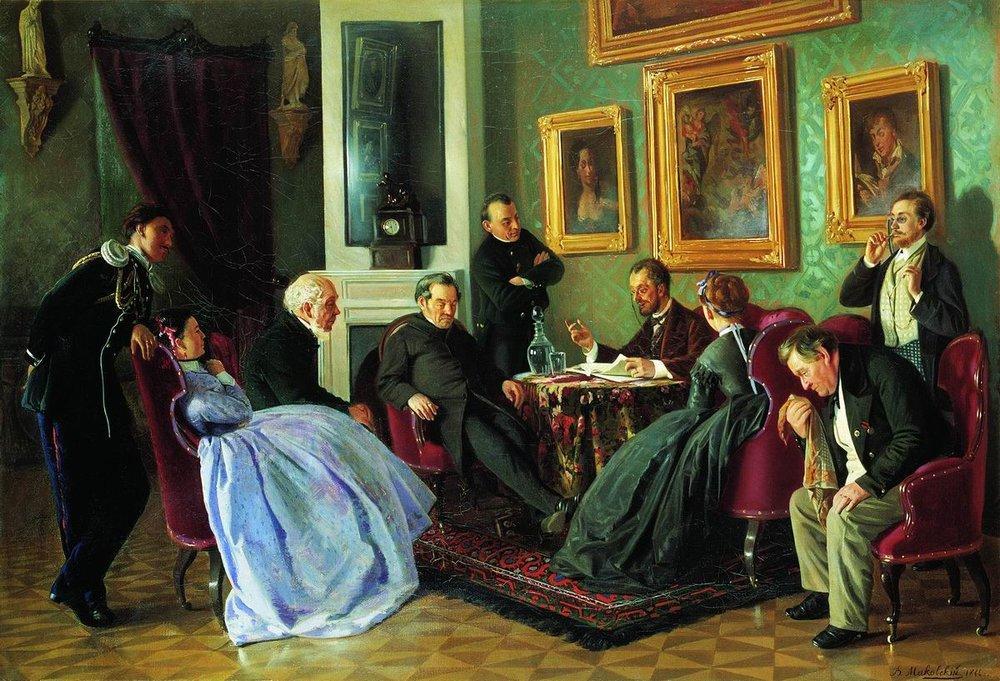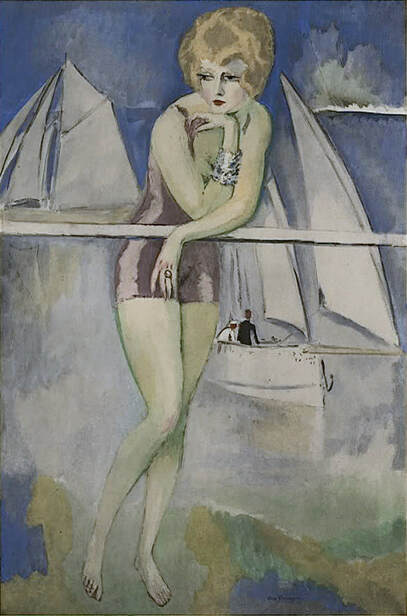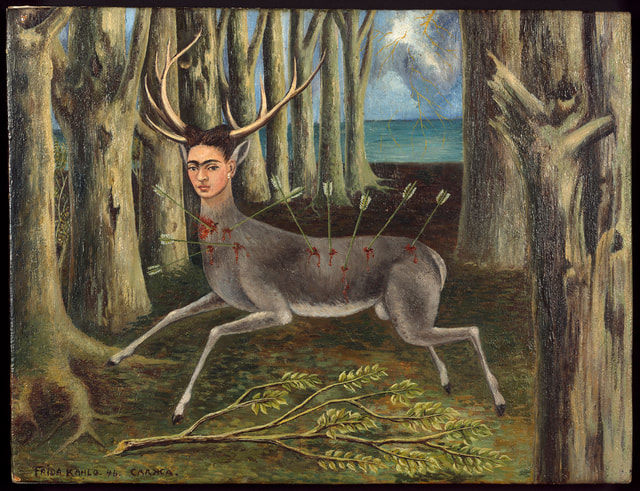|
Misconstrued Misconstrued, him: I am elegance embodied. Top-hatted, mustachioed, slim and tall, the kind of son who makes his mother proud. (If I had a mother.) (But of course I don’t have a mother.) (I’m paint on canvas, for God’s sake, oily residue of brush strokes, neither dead nor alive nor memorable in any way.) Do you see me? Actually notice me? Do you know which one I am? Of course not. I’m interchangeable with all of those other brown-clad men. I’m not in the background; I am the background. That’s my lot for all eternity, birthed from an artist’s momentary whim. I’m forever a foil, fettered to this canvas. I am elegance, empty and entrapped. Misconstrued, her: If I must be called into existence only to be pinned in perpetuity to this canvas, then I am grateful that Monsieur depicted me so wholesomely. I am as I appear: refined, demure, respectable. Had I a choice, I would have selected this self-same hat crowned with its ribbons of sunshine. I would have chosen this luscious stole, this tasteful clutch, the flattering fall and hue of this rosy gown. What I would not have chosen was this setting, this company. Look at that woman! Not just bareheaded (and doubtless perspiring), but voluntarily lofting her skirt, exposing what no self-respecting woman would ever let the public see-- the frilly fringe of her petticoat, those shockingly scarlet stockings, the curve of her calves. Misconstrued, altogether: I wriggle with happiness. I am still learning to sit and stay, to roll over (that’s one of my favourites!) to lie down (I’m less good at that) and to fetch. I’m too young to be still. I bounce and run and jump and chase. Especially jump. I’m mostly brown with some red highlights, that’s true, but why did master paint me in a dress? And where’s my tail? Doggone it. Anne R. Kirchmier Anne R. Kirchmier is an Episcopal priest serving in Newport News, Virginia. Many years ago she taught middle school English in western Massachusetts, but it took the Covid-19 pandemic to draw her into her first-ever poetry class (on Zoom, of course). She has so much to learn and looks forward to learning it!
0 Comments
The ekphrastic writing responses for this Willem van Haecht painting are up. Click here or on image above.
Penguins at the Art Museum On May 6, 2020, Humboldt penguins from the Kansas City Zoo visited the Nelson-Atkins Museum of Art. The people have to stay home to keep a virus from spreading, so Peruvian penguins have come instead. The museum director conducts their tour in Spanish as they explore. He thought they’d love Monet’s Water Lilies, that they’d feel calmed by the cool colors, but no. They wander by, preferring the warm red walls of the Baroque room, the slash- -and-brood poses of Caravaggio, the familiarity of human forms. I hope the penguins saw my favourite piece, Young Man in a Black Beret. Rembrandt turned the brush around, scraped its pointed end through thick paint to get those textured swirls in curly hair. I’ve seen how light catches a curl’s curve to the left of his lips, but I never noticed how his lips also curl, as if he’s slightly amused, as if he’s just been told, but can’t believe, that in three and a half centuries, penguins from Peru will waddle through a gallery across the globe and see his still-young face. Katie Manning Katie Manning is the founding editor-in-chief of Whale Road Review and a professor of writing at Point Loma Nazarene University in San Diego. She is the author of Tasty Other, which won the 2016 Main Street Rag Poetry Book Award, and her fifth chapbook, 28,065 Nights, is newly available from River Glass Books. www.katiemanningpoet.com. Jackson Pollock et al “I’ve been doing more painting lately,” she says, her eyes sparkling like a Gauguin girl poised at the edge of a deep dark green forest. “But I don’t think you would like them,” she adds sipping her coffee. Women, I think to myself, women. “Now why do you say that?” I ask. “I don’t know. They are really abstract and you’re more classical in your tastes.” “But I love the Impressionists,” I say in a weak defense. “I’m not Impressionistic. I am really Abstract, really,” she repeats. “Remember that painting in Robert’s office? You said you didn’t like it. I paint like that. Nope, I don’t think you’ll like my paintings.” If she could see the mess, the churning colour, texture, feelings, the massive cacophony swirling inside my head she certainly wouldn’t be saying that. But I can’t let it rest, I can’t. I love Abstract Art, I really do. I admit I don’t understand it as well as I’d like, but I am trying to learn more, certainly finding it easy to appreciate Paul Klee, Wassily Kandinsky, Umberto Boccioni, Jackson Pollack, and the others. “I’d like to see some of your paintings anyway. Maybe I could write poems to go along with them.” (The audacity, my hubris knows no bounds, to think I can write a poem to go along with anything, really, particularly with Abstract Art, Jesus what an idiot I am.) “It might be interesting, an interesting coming together of two art forms.” “OK,” she says right away, “I’ll send a couple to you over email.” Yes, her eyes are sparkling, sparkling like diamonds in the sunlight, or like cat’s eyes. In the five years I have known her, I’ve never seen her as excited, as animated, as this. She’s so excited I can barely eat my lunch. So she’s an artist. She’s really an artist. All she needs to do now is carve out some time and do it. She needs to study the masters and practice like crazy, paint, paint, paint until her knuckles are sore. Say, where is Jackson Pollock when we need him anyway? Michael Estabrook Michael Estabrook has been publishing his poetry in the small press since the 1980s. He has published over 20 collections, a recent one being The Poet’s Curse, A Miscellany (The Poetry Box, 2019). He lives in Acton, Massachusetts. Vibrant Voices and Public Places: an Ekphrastic Collection by Trinity Western University Students compiled by Prof. Melinda Dewsbury Summer 2021 Students from Trinity Western University’s summer version of “Literature and Culture” studied poetry and short fiction by writers including Chinua Achebe, Lu Xun, Saut Situmorang, Roque Dalton, Shin Kyong Nim, Daya Pawar, Amanda Gorman, Pablo Neruda, Li Qingzhao, Kohtaro Takamura, Sumitra Nandan Pant, Azita Ghahreman, L.M. Montgomery, Matsuo Basho, Mina Said Alayyan, Gabriela Mistral, Saadi Youssef, Nissim Ezekial, Susan Kiguli, Carrie Young, Emmanuel Ejen, Alootook Ipelli as well as biblical works of poetry and ancient origin stories. Through this exploration, students learned about worldview and identity as well as literary voice and technique. As their final project for the course, students experienced ekphrastic practice first through a workshop led by Ekphrastic Review editor Lorette C. Luzajic and then applied to their own creative process. Their assignment asked them to photograph public or street art in their community and write a response to this art. This is a celebratory collection of their work. Prof. Melinda Dewsbury Editor's note: It was a privilege to meet with Melinda's class online and share the joys of ekphrastic writing with students from Vancouver to China. We talked about art and different ways to look at it, and how to use the art around us to inspire reflection and poetry. Enjoy these heartfelt student poems, the first time writing poetry for many of them! Lorette Methed Up Teeth Man I am a methed up teeth man in a methed up town My spit spilled through teeth to wet Burrard My sweat flew to impress Stanley I am thirsty My sputum reclaimed Granville My brass-coloured breath leaks to the air I was told so much I was on the right path I soaked my son in booze He was not a good ferment I am a methed up teeth man in a methed up town. He is a methed up teeth man Brass meets buff My son lives in Shangri-La He has been trapped there for years He can never touch blacktop He is an even teeth man His talk in math Spits on the plastic bar Do you have some water? I am thirsty I am thirsty My thirst is squeezing my breath And my mouth And my throat Can you have my back, old man? Dongwoo Lee "My name is Dongwoo Lee, and I come from Korea. I study biotechnology at Trinity Western University. This is a quote from the film Hannah Arendt (2012): “The manifestation of the wind of thought is not knowledge, but the ability to tell right from wrong, beautiful from ugly”. This deeply affected my philosophy of life and I hope that thinking gives people the strength to live a truthful life. This poem will be my first literature that my thoughts will be a weapon, for all the alienated people from industrialization. Her Mind is a Map Her mind is a map, A story of her past, present and future. Her past Ancestors, travelling across the world for a chance at a new life Starting again in a land synonymous with fresh beginnings A childhood filled with laughter and make believe Lessons of “when you are chasing elephants, don’t follow rabbit tracks” And “you are a part of all you have met” Early morning car rides to church And late afternoon ones to Kumon The three musketeers and their dog, The unstoppable trio who will always be best friends Her present Studying hard for her future Days spent plotting and planning, Praying for her dreams to come true Quiet mornings filled with music and her Savior Afternoons filled with books and memorization Walks with her mom looking at trees dancing in the wind The river raising its arm in hello The sun smiling down at them as if to say “you have got this!” And finally, her future Oh, the places she will go! The world is an open book just waiting for her read The boogie men under her bed are no longer causes of fear But doll houses are still sources of joy She is no longer a girl, But not yet a woman Her mind is a map, A story that is ready to be explored Mackenzie Coleman Mackenzie Coleman is a graduating accounting student at Trinity Western University. She grew up in Winnipeg, Manitoba and now resides in Calgary, Alberta. Her childhood was influenced by her German and Mennonite upbringing. She dedicates this poem to her mother who always encouraged her with various quotes including, “When you are chasing elephants, don’t follow rabbit tracks.” Warden The spring, he is watching over Three waves of water hold up the twinkling pearl One glance, years passed Life is surging, tumbling, and blowing in it People praise the vitality inside They call it, it is spring, humble and powerful But the spring, still watching over Watching another life pass away. The spring is modest, not complacent even as a symbol of city Just like causality, creatures will always go where the spring is Life continuously spreads and grows like newborn flowers Natural deeds and human deeds Always equal When he comes Spring, it flows slowly People are no longer speechless by starving Willows flutter in the wind, full of greenery When he leaves Spring, it still trickles Everything is growing quietly behind When everyone looks behind The vitality of life blooms around Generations keep changing But the light blue of spring never fades Reflected by the bright pearl eyes It is still watching over The miracle and hope that life brings Tianze Wang "My name is Tianze Wang, and I am from China. I always think more than write. I tried to commemorate the academician Longping Yuan in the form of poetry. It may be a little vague, but I hope someone can know the question I asked in this poem." Thoughts of a Walker In the summer of 2020, I found myself sitting in my home trying to figure out what to do. With COVID-19 raging, I could not go out with friends, making my daily routine a never-ending cycle of work, home, work, home. I used to drive to the local grocery store where I worked, but my mother suggested that I should walk instead, claiming that it was good exercise. While I had no desire to do a 45-minute walk when I could drive it in five minutes, my mother’s idea was not a mere suggestion, but a motherly decree using the language of a suggestion to make me more receptive to the notion. I followed her instructions without complaint. In the beginning, I would listen to audiobooks and podcasts as I walked, while keeping a close eye on the cars, as I had to walk on the shoulder of a country road. The more I walked, the less attention I paid to the road and the more I took in the scenery. I started to notice things like the crisp smell of saltwater mixed with seaweed, and massive flocks of birds, too many to count, resting in the farm fields. I also began to notice and enjoy the long stretches of silence, punctuated by the occasional sound of a car, birds chirping, or the ferry horn bellowing, marking departure and arrival. I was one of the few people that walked this stretch of road, but once I got to the golf course that marked the edge of town, I would start to run into people. As I walked this populated stretch of road I took note of my fellow pedestrians: families with kids, people going to work, groups of kids looking for fun, and retirees with their golf clubs buzzing along in their carts, all of them nicely dressed. Some days, instead of sticking to the road, which was quicker, I would walk the dike instead, which ran alongside the beach, for a change of pace. As I walked the dike, I noticed the people that I passed were different than those on the roads and sidewalks. There were more bikers, dog walkers, and elderly people out for exercise. I also noticed those on the dike were more likely to nod or say hi to me as I walked. However, my favorite part of the dike was the wooden bird watching tower. From that tower, one got a unique view of the lower mainland. If you stand at the top and look east across the bay, you can see Crescent Beach and White Rock. If you look north, you can see the tall towers of New Westminster set to the imposing backdrop of the Rocky Mountains. Then, if you turn to the west, you can see the trees, swamps, and scrub brush that comprise Boundary Bay Park. Finally, when you look south, you can see the park filled with children and families and, just beyond that, Boundary Bay and Point Roberts. Towering above it all are the hills of Tsawwassen, filled with little specks of light showing the houses. Standing in that tower I felt at peace, watching the world go by and forgetting about its problems. As the summer of COVID dragged on, and I continued to walk to and from work, I started to understand a fundamental truth: you cannot know a place without walking through it regularly. When you walk through a place, you begin understanding its identity and how it came to possess it. At the end of the summer of COVID, my family moved to Ladner, which was only 15 minutes north of Tsawwassen. So, of course, the first thing I did was to start walking Ladner so I could get a feel for the town. While I began walking Ladner, I noticed immediately the smell of sea salt was nearly invisible in comparison to my previous home, as the prevailing scents were that of pine and farm fields. There was also the occasional mouth-watering smell of a cookout and the stink of weed. As I continued to walk, I observed several of the neighbourhood’s different characteristics, like how the clock tower at Trenant Park Square stands guard over Ladner or how, when I walked the main street, it felt like walking on the movie set for small-town USA. I also noticed the noises were substantially different from Tsawwassen. I could hear families playing and working in their yards. The sound of cars was no longer sporadic, but instead a constant hum. I also noticed the pedestrians were different, insofar as our interactions were limited to an exchange of nods. My fellow pedestrians were also incredibly diverse, as I observed a vast array of different ethnicities, genders, and cultures from many different walks of life, but all with a practical style of dress. As I walked through Ladner, which was only 15 minutes away from my old home, I was astonished at how different the two town’s identities are. Despite the numerous distinctions between them, both towns are similar in that they are proud of their unique identities. As I started to wear the soles of my shoes, and the sun began to set, the warm summer air ran through my hair as I asked myself to which of these identities I belong? I grew up in the US and Canada. I moved many times in both countries. This has given me a fascination with a sense of place and identity. I explore these ideas in my short story and I hope it helps other people to ask the question of what sense of place and identity means to them. J Money "I grew up in the US and Canada. I moved many times in both countries. This has given me a fascination with a sense of place and identity. I explore these ideas in my short story and I hope it helps other people to ask the question of what sense of place and identity means to them." Debate Our lives do matter They have, they will, forever It's not a debate My Life Why is a murder a debate? Only when it’s my life on the line. The colour of my skin determines Whether I leave certain places fine I’m proud of my blackness, The beauty, the history, the grace But now I’m told to always be careful Cause one wrong move and I could see heaven's gates It seems like the world doesn’t care, About the lives of our families and children It seems like every step forward we take The step backs are like a million. It’s a never-ending cycle, We need to see change and reform. We need to see it last forever, And not short term. Mary Haile My name is Mary Haile. I was born in Ethiopia, but due to political circumstances, my family and I were compelled to go to Egypt when I was two years old. I then arrived in Canada as a refugee when I was eleven years old. I'm a Biology major at Trinity Western University in Langley, British Columbia. Both of my poems were inspired by a Black Lives Matter protest that took place in my hometown called Smithers. This protest was to help both the Indigenous and Black communities living in my hometown. The Eternal Fire Burn, fire, burn! Let the truth be unturned You were evil with no soul You came here and you stole Our freedom, our ground You said it was enlightenment You told us, Buddhists should be converted You took away rights Thanks to a country of liberty Here lie the dead He was nothing but a monk A human with his good deed He sat still when the fire was lit His heart turned into a pearl-like relic Sacrifice left his name deathless. Tu Huynh My name is Tu Huynh. I am 19 years old. I am originally from Vietnam. I moved to British Columbia, Canada over 3 years ago as a student. I am a Biotechnology student at Trinity Western University in BC, Canada. 战胜洪水 天空正在怒吼 洪水正在咆哮 它从身体里爆裂开来 像猛兽一样 冲毁堤岸 它身体里的水不再清澈 充满浑浊 满河泥沙 残枝断叶 它身体中的人们奋力的挣扎 它将要带走众多人年轻的生命 有的人害怕它选择了放弃 40万军民齐心协力 修建防洪堤 将它分成好几份 流入大海 人们用血肉之躯 阻挡洪水的进攻 就像禹一样 成功保护我们的家乡 就在这时 一抹绿色从堤岸上悄然冒出 Defeat the Flood The sky is howling The flood is roaring It burst from the body Like a beast Washed out the embankment The water in its body is no longer clear Full of turbidity Full river sediment, Residual branches and broken leaves The human inside of it was struggling It will take away so many young lives Some people are afraid of it and choose to give up 400,000 soldiers and civilians make concerted effort Build levees Divide it into several parts Into the sea People use flesh and blood Stop the flood attack Just like Yu Successfully protected our hometown At this time A touch of green quietly emerged from the embankment Yuqian Wang My name is Yuqian Wang and I am from China. I am a Business student at Trinity Western University. I wrote this poem to commemorate the victory of the war against the flood. Untitled 这是一场没有硝烟的战争 This is a war without gunpowder 天使穿着白色的战衣 Angels are dressed in white 在钟老的带领下 under the lead of Mr. Zhong 此去明知荆楚险 They know it is dangerous to go there 一肩瘦弱裹征途 Their thin shoulders still choose to take the responsible 在红十字的建筑里冲锋陷阵 Fighting in the Red Cross building 使用”知识之矛”和”经验之盾” using the “knowledge spear” and “experience shield” 去打败戴着皇冠的恶魔 To beat evils with crown 这是一场没有硝烟的战争 This is a war without gunpowder 后线的士兵把握着最后的防线 The “soldiers” in the back line hold the last line of defense 他们关紧房门 They shut the doors tightly 白色的武器戴在脸上 Wearing the white weapon on their face 战胜焦虑与烦躁 Overcome the evils who call anxiety and irritability 与身边的人相互鼓励 Encourage the people around 共渡时艰 Tide over the difficulties together 总有一天 In the coming day 春暖花开之时 When flowers bloom in spring 我要把这一年的兵荒马乱 I want to boil this year’s chaos 熬成一壶青梅甜酒 into a pot of plum wine 在晚宴的觥筹交错里 In the toast of the dinner night 与你推杯换盏 talk and laugh with you 等长夜将白 Till the long night ends Zhiying Liu Zhiying Liu lives in Guangzhou, China and studies Business at TWU. Zhiying loves romantic poems and thinks past is passed, people should enjoy life now. 虾 潜心画艺三十冬, 水墨交融趣无穷。 若能悟得惜墨法, 聚水成虾自玲珑。 自古虾兵蟹为将, 今日挥毫论短长。 身重横行多笨拙, 腾跃戏水虾称王。 清明入季重重雨, 溪水河塘处处虾。 有纸不画空遗恨, 惜墨如金水乃佳。 世间万物多造化, 燕雀牛羊牡丹花。 水中精灵君须记, 逍遥最是小河虾。 不与鱼蟹争名高, 虬须长钳气堪豪。 他日成龙闹东海, 一跃能掀万里涛。 曾经水漫金山寺, 也曾浪逼陈塘关。 莫道虾小无大力, 亦能翻江掀巨澜。 披坚执锐气如虹, 纵横驰骋任西东。 虫豸鱼蟹谁能敌, 水乡泽国自威雄。 溪水河塘暂为家, 劈波斩浪向天涯。 敢往东海斗龟龙, 水族英杰当数虾。 Shrimp We don’t even save ink To bring shrimps to life. Shrimps were soldiers and crabs were generals Competing for ruling under water While shrimps are king to the river. No sooner raining in Tomb-Sweeping Festival Streams are filled with shrimp. While there are countless creatures in the world The only spirit in the water And tasty food on the stove. How tiny the prawns are With pincers longer than the body. The strength of the group is immense Roll up the big wave Become a dragon of the East Sea. Clad in a red cape Riding across the watery zephyrs Talking to the tsunami. Streams, rivers, and ponds as temporary homes Aquatic heroes the shrimps. Tianyu Zhu Tianyu Zhu is a student at Trinity Western University. He is proud to share his hometown with artist Qi Baishi, who has influenced him to observe the natural world more closely. The Theatre Closed Located on the busiest street in this small city, Between a bakery and a convenience store, Behind an unimpressive door, There was another world. Dates, nuts and tea were placed on the antique tables. Performers had put on their costumes with heavy makeup. The stage was all settled for the moment. After seconds of brief darkness, With the brilliant light and soft Huangmei tune, the opera started. The elders put down the teacup, The adults forgot the bothering, Only the children were still running around and imitating the performers once in a while. The familiar opera tune, The relaxing tea aroma, The soft atmosphere, All the images of the scene became misty, And time has clouded my memory. Located on the same street, Still between a bakery and a convenience store, A new Hot-pot restaurant opened. With flowers and firecrackers, The narrow facade became lively. I never went to it again. The performers took off the delicate costumes, Under the heavy makeup, The traces of time had nowhere to hide. Dongyong is still waiting for his beloved Seven, Nv Fu Ma is still worrying about how to face the princess. After a short period of darkness, Here comes the longer. Will the brilliance come back, Nobody knows. The theatre closed, When the last audience left. Zoe Zou I am Zoe Zou from a small city in China called Anqing. It’s the cradle of the declining culture “Huangmei Opera.” After reading my poetry, I hope you can occasionally think of this small city, this “Huangmei Opera” and the specific cultural heritage from your hometown. Flowers, a Beautiful Creation Flowers, flowers everywhere In the garden, in the hair In the vase, in the store On the table, on the door What a lovely time of year Flowers blooming bringing cheer. Flowers have been to temple prays. Flowers have been in people's graves. Either a lover or a person great Flowers are offered in different states. Standing high and enduring pain Smiling even in sun wind or rain. Life has never been easy. There have been days without beauty. Staying happy is a choice. Little things make life rejoice. Keep these things awake. So, it can make life great. Staying strong with a bright smile Keeps away the stress pile. Like flowers feed bees, Humans should learn from natural beauty. Feeding nature is human duty. Humans seem long forgotten. Making it worse to its bottom With some love, with some care Let us make this creation heavily fair. Aakriti Khurana I am Aakriti Khurana. I have been raised in a diverse Indian culture. I am a business student at Trinity Western University, Langley, BC. I came to Canada three years ago for studies. Reading has always been one of my hobbies, but writing has never been practiced by me. This is the first time I have tried to put something in words and hope to continue this forever. Sometimes, Love, it's Better to Say Goodbye Hello It's me! Your Ex! I cut my hair short, What's cut is, Your control and abuse of me in the past. You always judge on me, Dressing style, makeup style, and even hairstyle. Everything must be adapted to your preferences. You said you judge me because you love me But your Love is a birdcage I'm just a bird longing for freedom So... I am sorry, I just want to tear up everything you did to me in the past, I just want to get rid of the life under your control. Because it is not the Qing dynasty in a feudal society, You are not even the emperor, I am not the empress of you and anyone else. You know what? I am a woman, I am my own queen. I am a woman, I want to take control of my own life. I am a woman, I would always be myself. I am a woman, I can do everything you do. I am a woman, I make money and spend it myself. I am a woman, I love to go shopping in short skirts, sleeveless tops, and boots. I am a woman, I'm not a vase you put inside the house. I am a woman I am a red rose that never fades. I am a woman, I would be indomitable and keep moving forward. Hello, Can you hear me clearly? Remember my smiling face full of spring breeze!! Forget to tell you, Goodbye, I don't wanna see you anymore!!! ** 有时,爱适合说再见 喂,你好 是我! 我剪短了我的发, 剪断的是, 你过去对我的控制和辱骂。 你总是对我评头论足, 穿着,妆容, 甚至是发型风格 每一样都要顺应你的喜好。 你说你的批评是爱我的表现 可你的爱是个鸟笼 我却是只渴望自由的鸟 所以, 对不起, 我就是要撕碎你对我过去所做出的一切, 我就是要摆脱在你控制下的生活。 因为现在不是封建社会的清朝, 你不是皇帝, 我更不是你和任何人的皇后。 你知道吗? 我是一个女人, 我是自己的女王。 我是一个女人, 我要掌控属于我的人生大局 我是一个女人, 我要永远做我自己。 我是一个女人, 我能做所有你能做的。 我是一个女人, 我自己赚钱自己花 我是一个女人, 我爱穿短裙,吊带衣,搭配长靴去购物。 我是一个女人, 我不是你摆放在家里的花瓶。 我是一个女人, 我要做永不凋零的红玫瑰。 我是一个女人, 我会不屈不挠,一往直前。 哈喽, 你听清楚了吗? 记住我现在春风满面的笑容哟!! 忘记和你说了, 再见, 我再也不想看到你了! Theodora Liu My name is Theodora Liu, and I'm from the southern part of China. I am passionate about equal rights for men and women, and I hope to contribute to the movement for equal rights for women. Garden of Dolphins In the middle of the road these dolphins I see So aspiring and beautiful; make my heart flee As if telling the world to live free and dance And not to miss opportunity or chance To be in the moment and let our self breathe To leave despair and negativity beneath To live to the fullest and not sigh To work so hard and aim high These dolphins I see Are asking me to focus on my dreams No matter how far it is and how hard it seems And to share my happiness with others on the way Because in unity there’s always victory, they say These dolphins I see are showing me light And telling me to everything there’s a bright side So never give up and even if you fail You should start it all over again So that it could never be in vain! Vineet Bhandari My name is Vineet Bhandari, and I’m from India. I am pursuing a Bachelor of Business Administration at Trinity Western University. I like mountains and pretty clouds. I enjoy going on trekking and playing soccer. 你 我 他 灯红酒绿的街道 阳光下的冰 霜 洋溢笑容的家庭 孤独的考 拉 风在跟你拥抱 光在跟她握 手 雨水在旁边望着 望着那不变的传承 抓着那流动 的光束 拥有又不拥有着一切 You Me He Flourishing and jollification in the streets Ice and frost under the sun Every family full of smiles Lonely koalas The wind is hugging you The light is shaking her hand The rain watches in the distance Watching at the constant inheritance Hold the flowing beam of light To have and not to have everything Jingyi (Jenny) Zhang My name is Jingyi Zhang. I am an international student from China. I'm studying art and design at Trinity Western University. Although I major in art, I am not very good at poetry or literature, and I even think it isn't easy. That is my first attempt at poetry, which is also an exciting challenge. 擦肩而过 男: 当我与她擦肩的那0.01秒时, 犹如沐浴了春天的微风与冬日的暖阳, 所有的花朵都在争先恐后的盛开。 我幻想到了与她在一起的生活, 她伴随着夕阳坐在窗前静静地看着书, 我就坐在屋内离她不远的地方, 用指尖的演奏出优美的音乐。 我们同时抬头,相视一笑 就这样一起伴随着落日, 欣赏时间的痕迹。 女: 当我与他擦肩的那0.01秒时, 犹如炎炎夏日的第一口冰激凌, 所有的美好都在冰激凌进入口腔的那一刻起绽放。 我幻想到了与他在一起的生活, 他坐在柔软的沙发中擦拭他的琴弦, 我坐在他的旁边, 和他讲述一天中发生的趣事。 他抬起头,笑眯眯的看着我 我们就这样伴着暖黄色的灯光, 欣赏时间的痕迹。 男: 在与她擦肩的0.1秒时。 阳光与水分在不断浇灌着花朵, 花朵变得的茂密。 我想到我们在一起时的样子, 她会带领我勇敢的探索这个世界, 并永远对这个世界露出善良的微笑。 在探索世界的过程中, 她总是呵护我手中的琴包, 并坚定地鼓励我拿著我手中的琴包。 我们就这样在探索世界的过程中, 欣赏时间的痕迹。 女: 在与他擦肩的0.1秒时, 炎炎夏日与清凉的冰激凌对比越发强烈, 冰激凌的美好在不断地放大。 我想到了我们在一起的样子, 他会带领我探索不一样的世界, 并永远对这个世界露出充满希望的微笑。 在探索不一样的世界的过程中, 他总是站在我的身边 使我暂时忘记了肩上的包。 我们就这样在探索世界的过程中, 欣赏时间的痕迹。 在他们擦肩而过的1秒后, 阳光炽热而灿烂, 炎炎夏日枯萎了花朵,也融化了冰激凌。 他拿着手中的琴包从她身边路过, 她背着包从他身边走去。 在那一刻, 他突然想到, 他竟从没有注意到她肩上的包。 Brush Past Man: When I rubbed shoulders with her for the 0. 01 second, It was like I bathed in the breeze of spring and the warm sunshine of winter, All the flowers were in full bloom at that moment. I imagined my life after being with her: She is reading a book in front of the window with the sunset. I am sitting beside her, Playing beautiful music with my fingers. Just like this with the sunset, I appreciate the traces of time. Woman: When I rubbed shoulders with him for the 0. 01 second, It was like the first ice cream on a summer day, All the goodness bloomed in a moment when the ice cream entered my mouth. I imagined my life after being with him: He is wiping the chord on the soft sofa, I am sitting beside him, Talking about the interesting things that happened today, Just like this with warm light, I appreciate the traces of time. Man: When I rubbed shoulders with her for the 0. 1 second, Sunlight and water were constantly watering the flowers, Flowers became lush, I remember her when we were together, She takes me to explore this world bravely, And always shows a kind smile to this world. In the process of exploring the world, She will protect the violin bag which is held in my hand, And she will firmly encourage me to hold the violin bag in my hand. We are in the process of exploring the world, And appreciate the traces of time. Woman: When I rubbed shoulders with him for the 0. 1 second, The contrast between the hot summer and the cool ice cream is getting stronger, The goodness of ice cream is constantly being enlarged. I remember him when we were together, He takes me to explore the different world, And always smiles hopefully to this world. In the process of exploring this new world, He is always standing beside me, And he makes me forget the backpack on my shoulder for a while. We are in the process of exploring the new world, And appreciate the traces of time. They brush past after one second, The sun is hot and shining, The hot summer wilted the flowers and melted the ice cream. He holds the violin bag past her, She takes the backpack and walks by him. At that moment, He realized, He never noticed the backpack on her shoulder. Ziqi Liu Ziqi Liu is an international student from China. Many couples are facing the pressure between ideal and reality. In a relationship, when one person is under the pressure of life from relatives, friends and society, but another one is immersed in the world of chasing dreams. When the two people's goals in life are no longer the same, most lovers choose to break up this relationship. The purpose of my poem is evaluative. Let Go of Love The flower in the boy's heart withered. The boy's heart died. Who cannot understand the boy’s pain? He took his bags to search for his painful memories. He saw the sea of bitterness right in front of him. He is not willing to accept the reality. "The flower shop is closed. Do the flowers still open?" The flower in the boy's heart is no longer blooming. He saw a pink love rack. It was wrapped around a lot of people's heart locks The boy came forward to look. He saw the painful voice of a girl who was in love with some other. The boy felt the telepathy was so strong. He took up his pen and engraved encouragement on the lock. To help strangers and encourage them to face the future. He felt better and came out of the haze. Go to where the dawn rises and face the sea. Denghao Peter Wang I am Peter Wang, and in the poem I wrote I want to tell people “Don't cling to the past. We have to look to the future. Even if you are lovelorn, don't move forward with sadness. Maybe sharing to help a same injured person come out is what we should do.” The Pacific Melting Pot The beautiful west coast -- tormentor of my dreams, It is difficult to say this as one looks at the sun agleam. The pinnacle of westward expansion, What followed was the gold rush and oversized mansions, What made me be fortunate enough to find this area in my bloodstream? Once a land of nature and trees, Only taking what you need. Abandoned dreams of indigenous utopianism, Replaced with European colonialism. Livelihoods taken over with a smug, Two hundred and fifteen lives swept under a tattered orange rug. The dawn of one nation creates the fall of another, But this does not mean that we cannot see one another as brothers. As we move into the unknown, I am sure more issues will be prone. But we have come so far along as one, Where we can treat others as if they were our sons. A true melting pot which the rest of the world can wonder, Is on the horizon with more or less a blunder. As the waves crash down on the beautiful Pacific Ocean, One can’t help but be filled with emotion. As the land once filled with hostility, Has the reality of being filled with peace and tranquility? Ethan New My name is Ethan New, and I am from Port Moody, British Columbia but I am currently living in Gibsons. In my poem, I wanted to talk about an issue that was not commonly talked about until the atrocities which we saw in Kamloops earlier this year. As a west-coast native, I wanted to offer my input on how I see this region in the past, the present, and as well as the future. I am not trying to change anybody’s mind about any particular issue, but rather to shed light on an issue that cannot be talked about enough. Untitled There is a country where many people live. Every person of the country lives an extremely mediocre life. In the morning, children go to kindergarten, teenagers go to school, and adults go to their workplace. Then they eat dinner and spend time together at night. Living without being so special, there is one unique structure in this country. The pillar-like and bridge-like structure faces an endless sky. On the structure people walk all the time. One day, a boy asked his father. “Daddy, where is that bridge headed?” Then father smiled and said, “It’s headed to heaven”. The boy asked again. "Do you have to go with me?" Dad replied, "Of course, heaven is a good place. There are only warm spring and cool summer there. There are no bad people who commit crimes. You can meet someone you love, spend the rest of your life with them." However, the boy wondered and thought strange because there was no end to that structure and no one came back. Beyond the question of whether I should go, the boy began to think about the fundamental problem of whether we could use that structure. Not only the boy, but in fact everyone uses the structure at a certain time, and no one knows who made it or why. Unlike his father, who looked at the structure with anthropocentrism, he looked at the structure with naturalism. But it's just a boy's idea, and today countless people walk through the structure toward the sky. Seoneung James Kim My name is James. I’m from South Korea. I’m studying Media and Communications at Trinity Western University to become a wiser and better communicator. I'm trying to be a spiritual person, so I always pray and read the Bible and live in the word of God. Red String Yue Lao and Cupid have the same job Little red string in hand, connecting you and her His smile is like the brightest star in the night sky It is illuminating my world His smile is like the warm sun in winter It is warming my world He gently embraced me, making me crazy fascinated the air around him becomes fascinating The atmosphere begins to heat up It is dangerous and fascinating His voice seems to have been kissed by an angel Overdose, overdose… Yue Lao, Can you connect the two of us with a red string? I wish he could look back at me I was always there for him Yue Lao, Can you hear my heart’s desire? I hope you will… Shaoyu Naomi Zhang My name is Naomi. I am an international student from China now studying at Trinity Western University. Chinese and Western poets express themselves in different ways. For example, to express love, Chinese poets tend to be implicit and readers needed to read between the lines to understand the poet's deep meaning. On the other hand, western poets express their feelings directly and boldly. This time, I also used the direct boldness of western poets' characteristics to express my feelings. Sunflower Garden In 2010, December 15, a person who was wearing a white blouse and holding a bouquet of sunflowers was approaching a grave. His name is Nguyen. He was visiting the grave of a childhood friend. Then, he was suddenly nostalgic about this friend who was a little girl who yearned for a simple and healthy life… When he was 12, Nguyen suffered an injury and broke his arm while playing with his classmates. This accident caused him to have surgery and stay in the hospital for several weeks for observation and physical therapy. Every morning after physical therapy, he usually went for a walk alone in the hospital garden. Each time, he noticed a long-hair little girl sitting on a bench and facing the sun. Because of curiosity, he once came to talk with this strange friend. She was a quiet girl. However, she seemed to enjoy chatting with him because she had been in the hospital for a while but still had not had any friends there. She asked him how long he had had to stay in this hospital. Nguyen replied: "Just a few weeks after my body fully recovers, I will go home.” Hearing that, the girl was moved to say: “I wish I knew the day I could go back home like you. My life could be stuck here forever.” This girl had blood cancer, so her family wanted her to stay for treatment for a long time. Although her mom came to take care of her every day, she still felt lonely and sad because she could not go to school like normal children. Nguyen did not have any friends here either, so he decided to come and play with her. Nguyen remembers her saying that she loved the sun. Her room in the hospital had a very large window. Every morning, the sun would come through the window, shine on her bed and wake her up. She said, “Every morning if the sun can wake me up, that means… I'm still alive”. For that reason, every day she gazed at the sun and enjoyed its light because she was afraid that one day, she will never have a chance to see the sun. December 25th is the day that he was discharged from the hospital. He drew a picture of a sunflower for her. On the picture was written a few lines: “My mom said only sunflowers always face the sun. Just like you, so always be optimistic towards good things. I believe you will overcome and recover from the disease. I will never forget you”. Thus, on this day every year, Nguyen sent a sunflower to the hospital for the girl. Nevertheless, three years later, he suddenly received a letter that said she had passed away. There was a photo of her in the envelope. In the picture, she had no hair, but she was smiling and holding a sunflower in her hand. Behind the picture is her message: “Thank you for your sunflowers and encouragement. I have been strong, brave and optimistic to fight the disease.” More than ten years have passed, and Nguyen now is a doctor. On this day, he still visits her grave and brings a bouquet of sunflowers. He still vividly remembers the image of a little girl facing the sun like a sunflower. Standing for a while, he saw the sun gradually shone on her grave just like when she had been lying on a hospital bed. He put the bouquet down, smiled at her grave, and said “My little friend! We have faced towards the sun together.” Anh Que Chung I am Anh Que Chung from Vietnam. As an undergraduate student majoring in elementary education at Trinity Western University, I appreciate aspects related to the interests of children and aspire to help those who are unfortunate in their life. The story is inspired and based on a fundraising event each year for Vietnamese children with cancer through a symbol of sunflowers. In Vietnam, about 250,000 children were diagnosed with cancer in 2018. Every year, there are more than 160,000 children with cancer and 90,000 children die from cancer. This wall art was painted near the Primary Children's Hospital, Ho Chi Minh City, Vietnam. I Still Love You I still love you, Like wind travels thousands of miles, Take mine away all smiles. I still love you, Like rain never says goodbye, Lasting for the whole July. I still love you, Like a meteor falling to the ground, So life and death are gone beyond. I still love you, Like distance between sun and moon, Pointer of twelve, midnight and noon. I still love you, I regret not telling you, my dear, I love you, and for ten thousand-year. Jiaji Justin Ma Hello, everyone, I am Justin Ma. I come from China. This poem is called "I Still Love You", inspired by street graffiti on Yulin Road, Chengdu. The person in the graffiti is the protagonist of the classic Chinese comedy movie "A Chinese Odyssey Part Two-Cinderella", Monkey King. The text in the graffiti means "I regret not saying to my beloved one, I love you." This graffiti and text remind me of a love experience two years ago. At that time, I was studying in Toronto, and I met a girl in China by chance on the Internet. We had a very pleasant chat and felt that we liked each other. But until the end, we didn't confirm the relationship, and I didn't tell her that I like her. Homesickness 乡愁 要一杯拿铁,静坐; 望着黄浦江,发呆。 不可思议,一别,已有四年, 我不远万里,穿越时空来看你。 我回来了,来看看故乡的云; 我回来了,来吹吹故乡的风; 我回来了,来听听故乡的雨。 上海,你还好吗?是否别来无恙。 让我投入你的怀抱,紧紧不放手, 因为我已经独自漂泊地太久太久。 我想念上海的各种小吃, 想念大饼,油条,粢饭糕, 想念小笼,生煎,大馄饨。 我想念上海的乡音,想念上海便捷的轨道交通 我想念夜上海的霓虹,想念高架上的车水马龙。 想念弥漫在空气里那独特的都市的味道。 上海,你妖艳美丽, 上海,你繁华大气, 上海,你是闪烁在夜空里那颗最亮的星。 上海,你是东方的夜明珠!璀璨夺目! 只是,一个转身,不知何时再相见! Ask for a latte and sit quietly; Looking at the Huangpu River, in a daze. Unbelievable, one farewell, the past four years, I am not far away, looking at you through time and space. I'm back, come and see the clouds in my hometown; I'm back, come to blow the wind of my hometown; I'm back, come to listen to the rain in my hometown. Shanghai, how are you? I don't come here unharmed. Let me not let go every time I enter your arms, Because I have been wandering alone for too long too long. I miss all kinds of snacks in Shanghai, Miss flatbread, fried dough sticks, rice cakes, Miss Xiaolong, Pan-fried, Big Wonton. I miss the local accent of Shanghai and the rail transit of Shanghai. I miss the neon lights of Shanghai at night and the busy traffic on the elevated bridge. Miss the unique taste of the city in the air. Shanghai, you are charming and beautiful, Shanghai, your prosperous atmosphere, Shanghai, you are the brightest star in the night sky. Shanghai, you are the night pearl of the East! Brilliant! It's just that one turn around, and I don't know when to meet again! Jie Jane Wang I am Jie Wang, come from Shanghai, China. Jane is my English name. I have been an English teacher in Shanghai, China since I graduated from University. In 2014, I moved to Canada, and now I work with International Students in high school as an Education Assistant. On weekends, I teach Chinese online. I love teaching and love being with students, and I am glad to help and support the students from all over the world. Puzzle of Love Love, the squeaky-clean feeling, Breaks all boundaries and chains of bondage, You can never run away from love, Love lobs you to endless skies, Ooh, love, what is your limit? A young child stands up and raises their feet, All to fill the puzzle of love, His little fingers are stuck with the puzzle of love, The flip of love shakes his tiny feet, And up they uplift it to mighty glory, Woosh is this fleeting feeling of love, Ooh, love what is your limit? It heals crushed souls, Calms angry hearts, Empowers happy beings, Love is the roaring force of nature, And the missing piece in every face, Ooh love what is your limit? The love tender feeling, Leaves a soldier reeling, The stronger the love, The weaker your guard, Everywhere I turn I see red roses screaming love, With a red shield who can defeat me, Love revitalizes me, And makes my red blood race in a rush, The intensity shines through the valley of gloom, Even in sorrow, love heals the broken soul, Conquers the fears and terror, Your savory scent wheels away from the pangs of hunger, As Mirza dies for his Heer, And Romeo loved his Juliet to the end, Ooh love what is your limit? A young boy finds himself drunk in the cage of love, He refuses to open the door of hate, Even during light and darkness, Love glitters through his little heart, Ooh love what is your limit? No matter your age or size, You can’t conquer love, The glow of love makes small kids defeat giants, Chains and keys may lock you, Love will come to unlock you, Pain and anger won’t scare you, Love will shoot them through you, With love, the whole world flies, In the space of hate and darkness, Ooh love what is your limit? You give kids wings to fly. Love is the mountain of power and glory. Prabhjot Kaur I am Prabhjot Kaur, and I am an international student from India. I am doing my Associate of Biology from Langara College, but I chose to study this literature course at TWU. I am the kind of person who is always open to learn new things, and poetry is one of them. I always wanted to write love poetry and when I looked at this street art, that is the first thing that came to mind and inspired me to write this poem. The art that I chose, The Missing Piece, is located on 5 East 8th Ave (in 7 ½ lane) in Vancouver, BC. It is done by Vancouver based artist named iHeart. Most of his work is social commentary and is very much like Banksy’s work. Now Her feet united with the earth Both strong Toes found grip Soil and grasses generous hosts She moved with confidence The voice of her grandmother like the sun Warm energy Centuries of story and truth Carried her gliding On her people’s land The land the Creator provided on The back of a turtle. Now as clouds paint the sky above her As the sun rises and sets The same land holds her Feet tucked into grave No name, no voice No chance to mingle with Grandmother’s stories Sing in her beautiful language. Just Silence. White cloth blowing in the wind. Melinda Dewsbury Melinda Dewsbury looks forward to leading her students in the study of multi-cultural, multi-lingual literature every summer. She joins them in the practice of ekphrastic writing and in the study of literature as a rhetorical and evaluative exploration of human relationships, our connection to the natural world, our identity, and our spiritual formation. The Lady in the Painting Malignity is absent here. Raw materials breathe a mellow insanity, but never fear. On the contrary: they follow laconically the colours pure, minding only atmospheric luxated lines in their demure abdication of generic intention. Overall, the mood, intimate, conveys impressions (emerging slowly from the dewed nebulae of mild accretions by glazing craftily obtained) purposely reminding gazers of visions from their youth unstained. All you see, as sharp as razors-- because she knows the way by which duller hues can contrasts render besotting—is the beams that glitch easy comfort whilst the splendour you're wrapped in shakes you. Isn't she little, standing in the middle, between that old and twisted tree-- pondering facets of a riddle recalling memories she fled eagerly to dive in waters obscure and filled with all the red urges nurtured by our daughters whenever they awoke—and this cheerful, tall and bright old house where none was supposed to grieve, where bliss hardly leaves the place for elsewhere? Remains of previous times don't leave merely tracks and stains on canvas. Observe the seasons: they reprieve innocents alike and envious, mellifluous scoundrels from the woes lingering after the embrasement and the embracement, and the throes life, through the coming amazement, is bringing with itself. Our child is maintaining fragile balance. Nonplussing whirls of paint beguiled erring wanderers in the silence-- perhaps not silence, rather still bits of life, remembered morsels anonymously heaped until otherwise blown—that ensorcells deflated egos, humble wights. By and by, the hours of winter elapse together with the nights, bartering the snow winds splinter, long beating background hills, for chills yellow dawns of springs forgotten perchance will brighten. Warmth soon fills beechy meadowlands, nook-shotten ectopic groves in blossom where ruthless birds of prey in hiding unite and mate whilst they can bear onwards as the day goes sliding. Curvaceous fields in ranges stretch westwards, blond vales with wheat pregnant herefrom extending… Not a wretch near the heiress standing regnant, necrosis-free, will ever taste heart-scald, loss and doubt. Redeeming whoever, in a frenzied haste, crosses her domain in dreaming, orectic moods, she soothes the pangs undeterred explorers bring to realities in which time hangs evermore heavier. They cling to bewildered landscapes, not so still pictured lives and vanities. Their yokes and their shackles tamed their will, lest these cold realities, their belated lives one day be left empty, desolate, and void of bizarre, accepted slight—bereft, destitute of filth, destroyed. Of obliterating sprees that seize Adamites, in shame rejecting both roots and branches, leaving lees plainly chaste, and sap deflecting eloping mania to the wild, netherwards—there's naught worth saying. In times appointed, their defiled innocence will stop decaying. Long afternoons of summer pass absently away. Our daughter's lability's a looking-glass mingling fires and lustral waters in glebous magma and new forms on the surface of her being. Malignancy, through her, transforms rust to light. As wisdom's freeing her lips, her wordly gates unsealed, now for all of us unveils the cherished way out, the path concealed, weft beneath the warp, and scales the unvarnished paint won't hide. She sings old, unheeded songs: an oral ecbolic that delivers things rampant with an anger aural. Parhelic halos open skies blankly void until old creatures lasciviously crawl in, all eyes, yearning power, control of nature's effulging source which flows from here. Beasts of prey, they hunt and feed on debilitated hopes and sheer blood—for her apostles bleed on apocalyptic, cryptic glyphs on the fabric kythed. The picture's parerga will collapse. The gifts bound to them—so many strictures, narcotically induced—will fade. Eerie comes the night's new winter. In a day's year, time runs fast, made in the dreamland of a painter. All falls apart. She stands, her brush lowered in midair, uncertain. “Maybe I should this painting crush? Leave it hid behind a curtain? Obliterate it? Have it burnt?” Icy voices from her artwork remind her of the lesson learnt: Marvel not at your own brushwork… Romain P.-A. Delpeuch This poem first appeared in the New English Review. Author's note: "The Lady in the Painting" is the last chapter of a (so far unpublished) prosimetric novella, whose main character eventually becomes a painter. The poem is about her and one of her works. The painting it refers to is therefore completely imaginary. Romain P.-A. Delpeuch was born and bred in southwest France, where he still lives. His poetry and short fiction have appeared, or are forthcoming, in New English Review and Terror House Magazine. Die Skatspieler All the parts are here though not enough of each to go around these men unmembered, reduced to components. Here is an eye and an ear with a great grey tube that oozes mud and mustard on the table. A sleeve is pressed and folded neatly where an arm should be. Only one leg between them their lathed and varnished limbs like balustrades. Their shadows are all wrong and the hat rack is empty. Faces explode in craters ploughed furrows of bone and skin raw pink ground where nothing grows between tufted scrubs of moustache. Here are a quarter skull and jaw bone rendered in steel, branded, etched with the faceless outline of a bathing beauty they’ll not meet. Here is a peeled smile, an empty eye shot through to darkness beyond. News hangs in the air ignored, irrelevant, real as the blue paper suit, real as the playing cards pipped with hearts and silent bells. Between them the discard pile. Every card is on show yet they play in the dark while death glows from the gas-lamp like a caged moon. Abigail Flint Abigail Flint is a researcher from Sheffield (UK). Her poems have appeared in Popshot Quarterly, Consilience, About Larkin, 192 Magazine and Route 57, and in 2019 her poem "Coasting" placed second in the East Riding Festival of Words Poetry Competition. You can find her on twitter here@constantunusual Cezanne's Tears When we look at clouds, we see flying horseheads or bearded giants and miss the real. Over two and a half billion drops per cubic foot. Formations weighing over half a million tons. Friction juggling gravity until the drops exceed four one-hundreds of an inch. What falls then, are not tears or a simple transformation. It is like Cezanne’s apples. How he traded the sweetness of the flesh For the cold force inside, the force that binds the universe. David Leeds Author's note: "In my freshman year introductory art history class, we studied Cezanne’s Still Life with Commode, which was right there in front of us in the Fogg Museum. I was so mesmerized and kicked in the gut by this painting that I switched my major from government to art history. I was determined to understand the strength of my reaction and the fact that these apples seemed less like ordinary pieces of fruit, than some kind of very profound representation of essential experience and mysteries. I continued to focus on Cezanne and wrote my senior honours thesis on his self- portraits." David Leeds is a sculptor and poet who currently resides in Ojai California. He studied Art History at Harvard. Before devoting himself to poetry and sculpting, he wrote and directed the cult western, Shoot The Sun Down, with Chris Walken and Margot Kidder. David studied poetry with Jack Gilbert and Linda Gregg, among others. His work has appeared in the California Quarterly Review, Parnassus Literary Journal, and in the upcoming September issue of Passager Journal as well as others. Da Vinci’s Lady with an Ermine First day of Spring and All I want to do is march up and down the block proclaiming-- exactly what I’m not sure. Until I notice a teenage girl plopped on the grass by the neighbourhood ball field its bases gone. its linked chain entangled in leafless vines. She’s nuzzling I think her newborn babe—pure emblem of Spring. But no, it’s a ferret, and she’s gazing into the middle distance, one hand securing its neck. Nothing can convince me I’m not back in Krakow, Poland, the same Spring day--just stepping out of the museum where I could be DaVinci, having just tossed his brushes into the turps after the ferret nipped his hand and he snarled at its owner, the lady who had enough of his nonstop invective, who storms off with her pet, to sit and relax in the delicious Spring afternoon. Which is why I silently walk by. Leonard Kress Read another ekphrastic poem by Leonard Kress, here. Leonard Kress has published poetry and fiction in Missouri Review, Massachusetts Review, Iowa Review, American Poetry Review, Harvard Review, etc. His recent collections are The Orpheus Complex and Walk Like Bo Diddley. Living in the Candy Store and Other Poems and his new verse translation of the Polish Romantic epic, Pan Tadeusz by Adam Mickiewicz were both published in 2018. Craniotomy Sestinas appeared in 2020. He teaches philosophy and religion at Owens College in Ohio. www.leonardkress.com How I Spent My Summer Vacation: Ekphrastic Flash Fiction Contest
One month. 1000 words. theme: How I Spent My Summer Vacation. Entry fee: $10 CAD. Winner: $100 CAD. Choose one of these five paintings and use it as a prompt for a flash fiction story, along with the theme, "How I Spent My Summer Vacation." How you interpret the artwork and the theme is up to you. Fifty to 1000 words including title. Deadline: August 31, 2021 Submit your story to [email protected], along with a brief bio. Contest entry is below. |
The Ekphrastic Review
COOKIES/PRIVACY
This site uses cookies to deliver your best navigation experience this time and next. Continuing here means you consent to cookies. Thank you. Join us on Facebook:
July 2024
|
